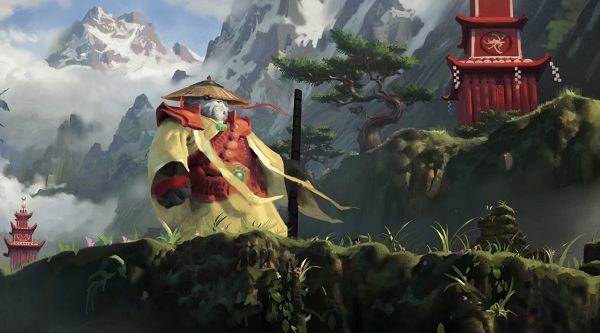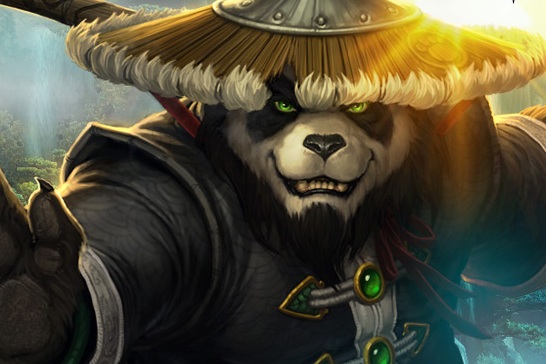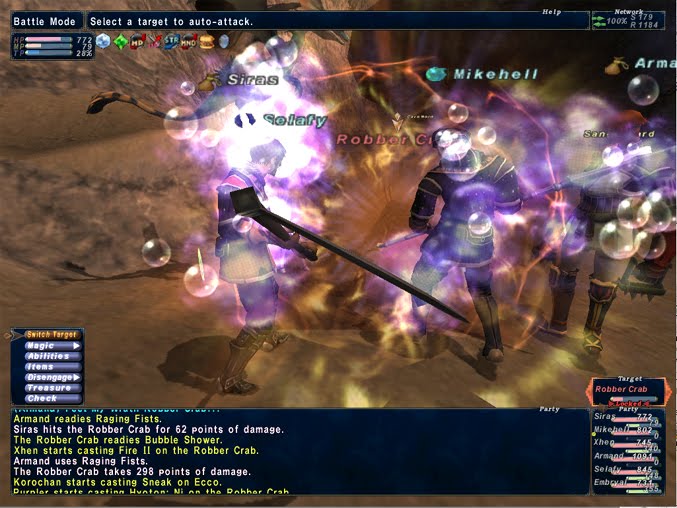Last updated on March 4, 2013

Well, since Pandaria’s coming out so soon, I think shifting focus towards the impending Mists of Pandaria would be a nice change of pace from all the bluffery about Assassin’s Creed.
I think I’m starting to get why Blizzard games are so popular. Immediately after playing any other game, World of WarCraft continues to captivate me. I mean apart from the social element. Or apart from the fact that my entire family plays the game due to my goading. nearly six years ago. Is it a sign of some mental addiction or disorder? I certainly don’t know; I took exactly one class in psychology, and then I transferred over to something else. But I think there’s a deeper reason why WoW sucks me into its world.
You’ll need a bit of background first. I was never much of a PC gamer at all; I mostly stuck to consoles, since I didn’t really see the need to buy a PC, especially because, until 1998, I didn’t even know they existed. Sheltered? Maybe. But I honestly had a great childhood, and I wouldn’t trade it in for anything. Nintendo dominated my childhood, along with Capcom, Squaresoft, and all the Japanese companies. We nostalgically pine for their success even as they continue to shower us with mediocre games, or by not releasing anything (Mega Man!).
Back to the point, my first gaming PC was a Dell I got in 2000. MDK2 (great game) and Unreal are the first games I remember playing in any real capacity, although never to completion. PC games never said “play me!” quite like the perfect design of the Japanese style. Still, neither were a favorite, and if I was going to pay the exorbitant costs for games that looked slightly better, or played slightly differently, than my N64 or Playstation, I’d stick with consoles, thanks. Plus, graphical settings? Vsync? Slowdown? This was not my ideal of perfection.
Of course, as PCs got better, it wasn’t much of a difference anymore – PCs had a stark advantage in terms of graphical prowess, although they lacked that extra “oomph” I was looking for. Having been trained on the Japanese aesthetics of bright colors and creative looking worlds, I just couldn’t bear to play these dark, gritty, and rather adult games (although, as this blog has made obvious, I am playing a LOT of those).
If you payed attention and connected the dots, you’ll see where I’m going with this.

In 2005 or so I was introduced to World of Warcraft by a friend. I was pretty horrendous at actually playing the game, but those bright colors drew me in. I had played WarCraft III, so I was vaguely familiar with the setting, but it was interesting! And fun! And I could play with friends! Well, that’s what I thought at the time, anyway. I picked a night elf hunter. It seemed cool enough; you get interesting toys, weapons, and things to play around with. I lost motivation, however, in hitting the level cap. My friend (and friends who joined later) basically power-leveled to 60 and left my poor hunter behind to rot. If you’re not playing with friends, then what’s the point? So I quit.
Now, I hadn’t forgotten that experience. I had just tucked it away so I could do schoolwork and graduate from high school. Free college tuition is much better than getting epic lewtz in Blackwing Lair, AMIRITE? Right?
I tried FFXI in the meantime. I figured I liked Final Fantasy games, so why not this? Assuming I’d get the same accessibility as WoW, I dived into the bitter, unforgiving world of Squaresoft’s apparently masochistic design tendencies. Once you’ve tried WoW, you don’t tend to like other MMOs, and I think there’s a good reason for this: accessibility. Simply put, MMOs before WoW were not accessible to the average gamer. That is, they required massive amounts of time to play for little reward. Yes, grinding can be considered a sort of “skill”, but it’s not the kind of skill a person used to console games craves. It’s certainly not one for which I have the time nor luxury. Why punish the player for playing your game?
At least in 2006, the cool stuff in FFXI was locked away. I want a Red Mage outfit, and I want it now! Not so, said Square-Enix: you must work hard for it, in a way that makes no sense to a new player. Not only that, the game gave little to no indication as to what the various roles of classes were, what was good, what was bad, was a quest worth doing, goals, etc. They throw you into an incredibly complex set of systems with little to no tutorial, and almost mandatory group questing. I’m fine with a little confusion; the fun of discovery never gets old. But are the things themselves worth the effort? There’s a niche for this, but why make it solely cooperative? For money, of course! But this is disingenuous to the consumer, who literally pays with their time rather than their skill.
Now, there are two ways to a teach a player: through the game itself, or through tutorials. FFXI did neither of these well at the time. Eventually, I had to quit, as did my brother who came along for the ride.

With that dissapointment out of the way, and free time at an abudance, I figured I could give WoW another shot. My brother agreed. I said we could probably play WoW. My brother also played console exclusively, so he was rather skeptical. We both decided, however, that a quality game is a quality game, regardless of brand, and so we jumped into the Blizzard boat together. He played a undead mage, I played a tauren druid.
Those were some good times, people! Questing, dungeons, figuring out class mechanics, and even trying to make an non-viable spec (moonkin druids of Vanilla WoW should know what I mean) work in level limit dungeons were just the tip. I’ve raided Molten Core and Zul’Gurub! It was my fault that I picked a druid, as they only healed at the time, but my ability to reach level cap speaks volumes about how much fun I was having.
I even got my parents into it. We all still play. But why? Well, as my father put it “It’s Secret of Mana online, basically”. Except this is an American game! And I think, if you’ve read this blog with any sort of regularity (or the backlog), you’d know that I supposedly have some kind of bias against that (although I am trying to change my ways)! Why do I play WoW continually, then?
What I described previously is only the game. WoW has a story, one derived from tying the loose ends of WCIII: specifically, Arthas and Illidan. Where were they? What were they up to? Those questions would be answered in time. Even with its cartoonish aesthetics and sense of humor, WoW was not without its dark moments. I mean, think of the kinds of villains the game has. As of Cataclysm, a nihilistic crazed dragon is trying to kill everyone. However, unlike in, say, Final Fantasy, we’ve had a whole expansion of quests, experiences, text, and cutscenes that establish the why and how of such villains. Blizzard has improved over time – we aren’t stuck with a Sephiroth archetype. The Lich King is such an interesting villain because he was once a paladin, and it has been established that he is now a composite of multiple people.
Plot points established expansions ago (such as the Old Gods) gets answered later, but with just enough mystery and intrigue to add that extra flavor. People who play constantly and get burned out miss out on this because they’re focused on the goal and not all the little details Blizzard has put into the story of an ENTIRE WORLD. I just love the lore, the world, the characters – it’s all been done before, but not quite like this!
Metzen has a very Christian theme of redemption going on all the time in these things. If his recent statements regarding Illidan are anything to go by, he’ll get his own redemption for being both hero and villain alike, misunderstood and misunderstanding. It’s that kind of thing to which anyone can relate, even in characters that state they reject redemption (Arthas), yet still keep the world from total destruction even as they purport to do the opposite. Deathwing was less that, and more a tool of the Old Gods, but that’s cool too! What’s important is that the story is always developing, even if you don’t notice it. The Yogg-Saron fight, for example, has a point where one goes into the god’s mind, to find a sequence where Arthas tortures an unnamed prisoner; how you can develop a story in the midst of a boss fight is pretty amazing, but Blizzard knows how to slowly unfurl a story over a period of months, even years! That’s good storytelling. They definitely have a giant lore document somewhere that records all these details for consistency’s sake; how could they possibly keep up with all of this?

The cooperative aspect only adds to these elements. You have to work as a team to win in end-game content, or even in some quests. It’s fun cooperation, though (as long as everyone actually wants to play right). Sometimes frustrating, sometimes exhilarating (like when my family finally beat Yogg-Saron with 4 people – I was yelling and fist-pumping), it’s really quite a joy when it all comes together.
The system is based on good mechanics, too! Blizzard eases you into your ability set regardless of class, and though the system’s not perfect, you can play without looking up anything outside the game. If you like to play some way, you can here. I like to optimize, so Elitist Jerks is a frequent internet destination for me, but it’s not necessary. I’m leveling a Warlock, currently, and he’s been a blast, even if their spell rotations are messed up. But it’s very much Secret of Mana-esque, just with a bigger ability set and the the frequent need to dodge attacks (or “stay out of the stuff on the ground”, the best hint you’ll ever get in this game).
If Blizzard can get a guy like me playing WoW, they can get anybody. It’s because they found a WHOLE GAME that works, not merely good game mechanics or aesthetics or story. It’s an integrate experience. That’s what gets me playing the game. Could we call it a “holistic experience”? I suppose. But that’s just pretentious. Rather, it’s just a great game that has aged particularly well. Not many eight year old games continue to receive updates and have nine million people play it. That’s pretty remarkable for any game, but for nearly a decade? That’s a phenomenon.
I doubt many of us understand why we play. Sure, I could chalk it up to the design being “getting loot”, and this encourages people to play, but it’s more than that. These are communities, guilds, and people. The Internet just happens to be the place where you interact with them. It’s Web 2.0 at its finest. We all group together to get stuff, sure, but that falls by the wayside over time as people just enjoy the game itself.
This gives me ideas. Churches could just as easily function in this sense; does it matter whether two or three are gathered in person or on the Internet, does it? Matthew 18 has more to say:
15 “If your brother sins, go and show him his fault in private; if he listens to you, you have won your brother.16 But if he does not listen to you, take one or two more with you, so that by the mouth of two or three witnesses every fact may be confirmed. 17 If he refuses to listen to them, tell it to the church; and if he refuses to listen even to the church, let him be to you as a Gentile and a tax collector. 18 Truly I say to you, whatever you bind on earth shall have been bound in heaven; and whatever you loose on earth shall have been loosed in heaven.
19 “Again I say to you, that if two of you agree on earth about anything that they may ask, it shall be done for them by My Father who is in heaven. 20 For where two or three have gathered together in My name, I am there in their midst.”
This is easy and attainable in the online realm with much, much greater regularity than elsewhere. We’re not judged by our personal appearance, lifestyle, or have to meet these people anywhere but online. Personal group politics don’t get into the mix (church politics aren’t fun, let me tell you). Anonymity, in this sense, isn’t the case; you are your character to everyone else, and remain accountable. Skill becomes a far greater attribute than any arbitrary characteristic. That’s a great boon to this process. How many times have I reprimanded some party member for acting dumb? Plenty, and I’ve had people who know the fights chime in. The system regulates itself. People must be nice and friendly by choice; it’s not forced. If you want to be anti-social, go ahead, but you’ll be having far less fun than us. Guilds are filled with real people like you and me. It’s almost like how a Church should be.
Of course, there’s fighting and conflict. But these can be resolved if the two sides are willing to work it out; after all, it’s just about fake loot in a game. You can always diffuse a conflict as such, to varying degrees of success. Some say it’s less communicative. How so? We’ve got voice chat, we’ve got video chat, and every other device known to man. I don’t see the problem here. What we do online says a lot about us, either way. But maybe I’m just a dreamer, but I think churches could really learn something from the WoW process. As the game has progressed, the time-consumption aspect of level 60 raiding has all but disappeared. We play for fun rather than fake accomplishments. And this is a thing of beauty.
That’s why Blizzard had such a hit with WoW – accessibility, cooperation, and excellent mechanics. I wonder if the Church could honestly say the same.
